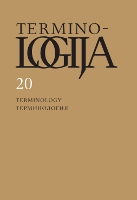Dėl mokslo terminų vienareikšmiškumo supratimo
About understanding the unambiguity of the terms of science
Author(s): Stasys KeinysSubject(s): Theoretical Linguistics, Applied Linguistics, Semantics, Descriptive linguistics
Published by: Lietuvių Kalbos Institutas
Keywords: term; scientific term; terminology; uniqueness;
Summary/Abstract: Unambiguity is usually treated as one of the important features of a term and quite often it is viewed as one of the main requirements of terms. Therefore polysemy of a term is treated as a fault. However, polysemous terms are quite frequent in term recording works (special dictionaries, encyclopedias, etc.) as well as in scientific texts of various domains. This article deals with the problem of unambiguity of terms of science in respect of science development and naming system of the language. First of all it is noted that the words and terms vienareikšmis (unambiguous) and vienareikšmiškumas (unambiguity) are not unambiguous themselves, because on the one hand they mean ‘having only one meaning’ and on the other hand – ‘having the same meaning’. When speaking about the unambiguity of terms often both these meanings are kept in mind, but more frequently the oneness of term meaning is emphasized. The Lithuanian philosopher Stasys Šalkauskis (1886–1941) who published his works on terminology theory and practice from 1927 onwards gave a reasoned argument against strict restraint of the meaning of terms. In his work Terminologijos teorija (Terminology Theory) Šalkauskis wrote: “<...> ir patekę į mokslinę terminiją, žodžiai nesustingsta semantiniu atžvilgiu, o yra palenkti tolimesnei evoliucijai, kuri niekados nesibaigia, kol kalba yra gyva tautos dvasioje” (translation: “<...> and when words make their way into scientific terminology they do not freeze in semantic respect, but are inclined towards further evolution which never stops while the language is alive in the spirit of a nation”). These words are very important for the cognition of the essence of science and its language creation.
Journal: Terminologija
- Issue Year: 2013
- Issue No: 20
- Page Range: 47-55
- Page Count: 8
- Language: Lithuanian

